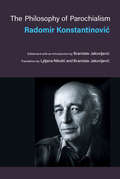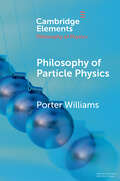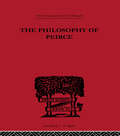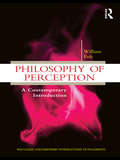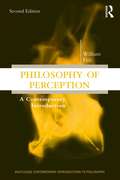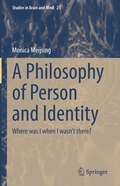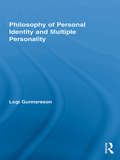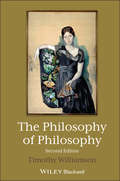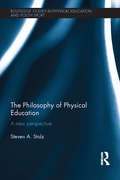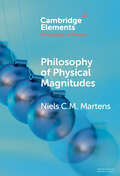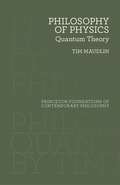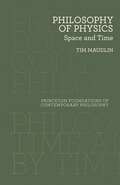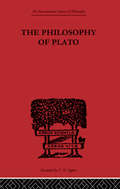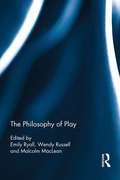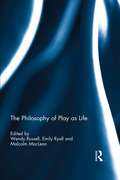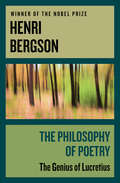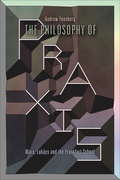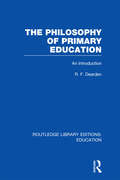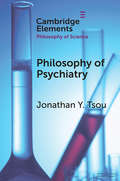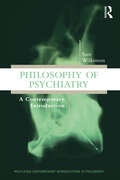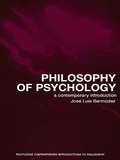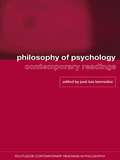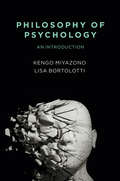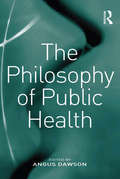- Table View
- List View
The Philosophy of Parochialism
by Radomir KonstantinovicThe Philosophy of Parochialism is Radomir Konstantinovic’s (1928–2011) most celebrated and reviled book. First published in Belgrade as Filosofija palanke in 1969, it attracted keen attention and controversy through its unsparing critique of Serbian and any other nationalism in Yugoslavia and beyond. The book was prophetic, seeming to anticipate not only the bloody disintegration of Yugoslavia in the 1990s, but also the totalitarian turn in politics across the globe in the first decades of the new century. With this translation, English-speaking audiences can at last discover one of the most original writers of eastern European late modernism, and gain an important and original perspective into contemporary politics and culture in the West and beyond. This is a book that seems to age in reverse, as its meanings become deeper and more universal with the passage of time. Konstantinovic’sbookresists easy classification, mixing classical, Montaigne-like essay, prose poetry, novel, and literary history. The word “philosophy” in the book’s title refers to the solitary activity of reflection and critical thinking, and is also paradoxical: according to the author, a defining characteristic of parochialism is precisely its intolerance toward this kind of self-reflexivity. In Konstantinovic’s analysis, parochialism is not a simply a characteristic of a geographical region or a cultural, political, and historical formation—these are all just manifestations of the parochial spirit as the spirit of insularity. His book illuminates the current moment, in which insularity undergirds not only ethnic and national divisions, but also dictates the very structure of everyday life, and where individuals can easily find themselves locked in an echo chamber of social media. The Philosophy of Parochialism can help us understand better not only the dead ends of ethnic nationalism and other atavistic ideologies, but also of those cultural forces such as digital technologies that have been built on the promise of overcoming those ideologies.
Philosophy of Particle Physics (Elements in the Philosophy of Physics)
by Porter WilliamsThis Element offers an introduction to selected philosophical issues that arise in contemporary particle physics, aimed at philosophers who have limited prior exposure to quantum field theory. One the one hand, it critically surveys philosophical work on the representation of particles in quantum field theory, the formal machinery and conceptual implications of renormalization and renormalization group methods, and ontological and methodological questions raised by the use of effective field theory techniques in particle physics. On the other, it identifies topics in particle physics that have not yet received philosophical attention and sketches avenues for philosophical analysis of those topics. The primary aim of the Element is to provide philosophers of physics with an entry point into the literature on the philosophy of particle physics and identify interesting directions for future research for students and researchers alike.
The Philosophy of Peirce: Selected Writings (International Library of Philosophy)
by Justus BuchlerFirst published in 2000. Routledge is an imprint of Taylor & Francis, an informa company.
Philosophy of Perception: A Contemporary Introduction
by William FishThe philosophy of perception investigates the nature of our sensory experiences and their relation to reality. Raising questions about the conscious character of perceptual experiences, how they enable us to acquire knowledge of the world in which we live, and what exactly it is we are aware of when we hallucinate or dream, the philosophy of perception is a growing area of interest in metaphysics, epistemology, and philosophy of mind. William Fish’s Philosophy of Perception introduces the subject thematically, setting out the major theories of perception together with their motivations and attendant problems. While providing historical background to debates in the field, this comprehensive overview focuses on recent presentations and defenses of the different theories, and looks beyond visual perception to take into account the role of other senses. Topics covered include: the phenomenal principle perception and hallucination perception and content sense-data, adverbialism and idealism disjunctivism and relationalism intentionalism and combined theories the nature of content veridicality perception and empirical science non-visual perception. With summaries and suggested further reading at the end of each chapter, this is an ideal introduction to the philosophy of perception.
Philosophy of Perception: A Contemporary Introduction (Routledge Contemporary Introductions to Philosophy)
by William FishThe philosophy of perception investigates the nature of our sensory experiences and their relation to reality. In the second edition of this popular book, William Fish introduces the subject thematically, setting out the major theories of perception together with their motivations and attendant problems. While providing historical background to debates in the field, this comprehensive overview focuses on recent presentations and defenses of the different theories, and looks beyond visual perception to take into account the role of other senses. The second edition organizes the contents into two main parts: the first deals with philosophical theories of perception, and the second covers key topics and issues in perception as they are discussed in philosophy, cognitive science, and psychology. Two completely new chapters have been added – one on color and color vision; and a second on the interaction between sense modalities – and other chapters have been significantly updated to include discussion of topics such as pre-twentieth-century philosophy of perception, phenomenal intentionality, color adverbialism, predictive processing approaches to perception, ecological approaches to perception, and in-depth discussions of the non-visual senses. Additional updates include fuller and easier-to-understand explanations of some important views that were glossed over in the first edition and greater coverage of research from the last 25 years. All chapter summaries, references, and Suggested Reading lists at the end of each chapter have been brought up to date and the volume now includes a more extensive index at the back of the book. Key Features and Benefits: The only single-authored textbook on philosophy of perception currently available Devoted to contemporary theories and topics, but with appropriate historical coverage for fuller understanding of contemporary work Each chapter includes a chapter overview, questions for further consideration, and an annotated list of Suggested Readings Includes coverage of topics like: - the phenomenal principle- perception and hallucination- perception and content- naïve realism and disjunctivism - intentionalism and representationalism- the nature of content- qualia theories and phenomenal intentionality- perception and empirical science- color and color science- theories of non-visual perception- Molyneux’s problem- cross-modal illusions- multimodality Key Changes to the Second Edition The division of the book into two major parts: Part I on philosophical theories of perception, Part II on key interdisciplinary topics in perception The addition of two new chapters on color and color vision, and interaction between different sense modalities More topics from the last 25 years of philosophy of perception Combined chapters on belief acquisition theories and intentional theories into one larger chapter More material on the growing intersection of the philosophy and psychology of perception Includes coverage of Molyneux’s problem and of cross-modal illusions Updated chapter summaries, references, and Suggested Reading lists at the end of each chapter A summary table and a more extensive index
A Philosophy of Person and Identity: Where was I when I wasn’t there? (Studies in Brain and Mind #21)
by Monica MeijsingThis book discusses the themes of personhood and personal identity. It argues that while there is a metaphysical answer to the question of personal identity, there is no metaphysical answer to the question of what constitutes a person. The author argues against both body-mind dualism and physicalism and also against the idea that there is some metaphysically real category of persons distinct from the category of human beings or human organisms. Instead, the author presents neutral-monist, autopoietic-enactivist kind of metaphysics of the human being, and a relational, and completely human-dependent notion of a person. The tools used in these arguments include conceptual argumentation and empirical case studies. Using both personal experiences and studies of cultures all over the world, the author examines dualism between mind and body. The author discusses real people who seem to live a Cartesian life, as somehow disembodied minds as well as the concept of the person. The author uses the concluding chapters to present their own views arguing that questions about our identity should be separated from questions of our personhood as well as the concept of personhood. This volume is of interest to scholars of philosophy of mind.
Philosophy of Personal Identity and Multiple Personality (Routledge Studies in Contemporary Philosophy)
by Logi GunnarssonAs witnessed by recent films such as Fight Club and Identity, our culture is obsessed with multiple personality—a phenomenon raising intriguing questions about personal identity. This study offers both a full-fledged philosophical theory of personal identity and a systematic account of multiple personality. Gunnarsson combines the methods of analytic philosophy with close hermeneutic and phenomenological readings of cases from different fields, focusing on psychiatric and psychological treatises, self-help books, biographies, and fiction. He develops an original account of personal identity (the authorial correlate theory) and offers a provocative interpretation of multiple personality: in brief, "multiples" are right about the metaphysics but wrong about the facts.
The Philosophy of Philosophy (The Blackwell / Brown Lectures in Philosophy)
by Timothy WilliamsonThe expanded new edition of one of the most influential and controversial books about the nature of philosophy published in the past several decades The Philosophy of Philosophy presents an original, unified concept of philosophy as a non-natural science. In this provocative work, distinguished philosopher Timothy Williamson challenges widely-held assumptions and clarifies long-standing misconceptions about the methodology and nature of philosophical inquiry. The author rejects the standard narratives of contemporary philosophy developed from naturalism, the linguistic turn, postmodern irony, and other prominent trends of the twentieth century. Viewing the method of philosophy as evolving from non-philosophical pursuits, Williamson provides readers with fresh insight into the “self-image” of philosophy and offers new ways of understanding what philosophy is and how it actually works. Now in its second edition, this landmark volume comprises the original book and the author’s subsequent work. New topics include the recent history of analytic philosophy, assessments of experimental philosophy, theories of concepts and understanding, Wittgensteinian approaches, popular philosophy, naturalism, morally-loaded examples in philosophy, philosophical applications of scientific methods, and many more. This edition features the author’s latest thoughts on a variety of issues, autobiographical reflections, and replies to critics. Proposes an alternative narrative about the nature of philosophy Argues that the common assumption of philosophical exceptionalism is false Highlights the similarities between philosophy and the other sciences in both methodology and subject matter Explores why contemporary philosophy has failed to articulate an adequate methodology Emphasizes increasing the methodological standards of reasoning in philosophy The Philosophy of Philosophy, Second Edition remains essential reading for philosophers, scholars, graduate and advanced undergraduate students in philosophy, and other readers with a sustained interest in the method and rationale of the doing of philosophy.
The Philosophy of Physical Education: A New Perspective (Routledge Studies in Physical Education and Youth Sport)
by Steven A. StolzThe discipline area of physical education has historically struggled for legitimacy, sometimes being seen as a non-serious pursuit in educational terms compared to other subjects within the school curriculum. This book represents the first attempt in nearly thirty years to offer a coherent philosophical defence and conceptualisation of physical education and sport as subjects of educational value, and to provide a philosophically sound justification for their inclusion in the curriculum. The book argues that rather than relegating the body to “un-thinking” learning, a person’s essential being is not confined to their rationality but involves an embodied dimension. It traces the changing conceptions of the body, in philosophy and theology, that have influenced our understanding of physical education and sport, and investigates the important role that embodiment and movement play in learning about, through and in physical education. Physical education is defended as a vital and necessary part of education because the whole person goes to school, not just the mind, but the thinking, feeling and acting facets of a person. It is argued that physical education has the potential to provide a multitude of experiences and opportunities for students to become aware of their embodiment, explore alternative modes of awareness and to develop insights into and new modes of being not available elsewhere in the curriculum, and to influence moral character through the support of a moral community that is committed to that practice. Representing a sophisticated and spirited defence of the educational significance and philosophical value of physical education and sport, this book will be fascinating reading for any advanced student or researcher with an interest in physical education, the philosophy of sport or the philosophy of education.
Philosophy of Physical Magnitudes (Elements in the Philosophy of Physics)
by null Niels C. MartensDimensional quantities such as length, mass and charge, i.e., numbers combined with a conventional unit, are essential components of theories in the sciences, especially physics, chemistry and biology. Do they represent a world with absolute physical magnitudes, or are they merely magnitude ratios in disguise? Would we notice a difference if all the distances or charges in the world suddenly doubled? These central questions of this Element are illustrated by imagining how one would convey the meaning of a kilogram to aliens if one were only allowed to communicate via Morse code.
Philosophy of Physics: Quantum Theory (Princeton Foundations Of Contemporary Philosophy Ser. #19)
by Tim MaudlinA sophisticated and original introduction to the philosophy of quantum mechanics from one of the world’s leading philosophers of physicsIn this book, Tim Maudlin, one of the world’s leading philosophers of physics, offers a sophisticated, original introduction to the philosophy of quantum mechanics. The briefest, clearest, and most refined account of his influential approach to the subject, the book will be invaluable to all students of philosophy and physics.Quantum mechanics holds a unique place in the history of physics. It has produced the most accurate predictions of any scientific theory, but, more astonishing, there has never been any agreement about what the theory implies about physical reality. Maudlin argues that the very term “quantum theory” is a misnomer. A proper physical theory should clearly describe what is there and what it does—yet standard textbooks present quantum mechanics as a predictive recipe in search of a physical theory.In contrast, Maudlin explores three proper theories that recover the quantum predictions: the indeterministic wavefunction collapse theory of Ghirardi, Rimini, and Weber; the deterministic particle theory of deBroglie and Bohm; and the conceptually challenging Many Worlds theory of Everett. Each offers a radically different proposal for the nature of physical reality, but Maudlin shows that none of them are what they are generally taken to be.
Philosophy of Physics: Space and Time (Princeton Foundations of Contemporary Philosophy #11)
by Tim MaudlinPhilosophical foundations of the physics of space-timeThis concise book introduces nonphysicists to the core philosophical issues surrounding the nature and structure of space and time, and is also an ideal resource for physicists interested in the conceptual foundations of space-time theory. Tim Maudlin's broad historical overview examines Aristotelian and Newtonian accounts of space and time, and traces how Galileo's conceptions of relativity and space-time led to Einstein's special and general theories of relativity. Maudlin explains special relativity with enough detail to solve concrete physical problems while presenting general relativity in more qualitative terms. Additional topics include the Twins Paradox, the physical aspects of the Lorentz-FitzGerald contraction, the constancy of the speed of light, time travel, the direction of time, and more.Introduces nonphysicists to the philosophical foundations of space-time theoryProvides a broad historical overview, from Aristotle to EinsteinExplains special relativity geometrically, emphasizing the intrinsic structure of space-timeCovers the Twins Paradox, Galilean relativity, time travel, and moreRequires only basic algebra and no formal knowledge of physics
The Philosophy of Plato (International Library of Philosophy)
by Rupert C. LodgeFirst Published in 2000. Routledge is an imprint of Taylor & Francis, an informa company.
The Philosophy of Play
by Emily Ryall Wendy Russell Malcolm MacLeanPlay is a vital component of the social life and well-being of both children and adults. This book examines the concept of play and considers a variety of the related philosophical issues. It also includes meta-analyses from a range of philosophers and theorists, as well as an exploration of some key applied ethical considerations. The main objective of The Philosophy of Play is to provide a richer understanding of the concept and nature of play and its relation to human life and values, and to build disciplinary and paradigmatic bridges between scholars of philosophy and scholars of play. Including specific chapters dedicated to children and play, and exploring the work of key thinkers such as Plato, Sartre, Wittgenstein, Gadamer, Deleuze and Nietzsche, this book is invaluable reading for any advanced student, researcher or practitioner with an interest in education, playwork, leisure studies, applied ethics or the philosophy of sport.
The Philosophy of Play as Life
by Emily Ryall Wendy Russell Malcolm MacLeanIt is now widely acknowledged that play is central to our lives. As a phenomenon, play poses important questions of reality, subjectivity, competition, inclusion and exclusion. This international collection is the third in a series of books (including The Philosophy of Play and Philosophical Perspectives on Play) that aims to build paradigmatic bridges between scholars of philosophy and scholars of play. Divided into four sections (Play as Life, Play as Games, Play as Art and Play as Politics), this book sheds new light on the significance of play for both children and adults in a variety of cultural settings. Its chapters encompass a range of philosophical areas of enquiry such as metaphysics, aesthetics and ethics, and the spectrum of topics explored includes games, jokes, sport and our social relationship with the Internet. With contributions from established and emerging scholars from around the world, The Philosophy of Play as Life is fascinating reading for all those with an interest in playwork, the ethics and philosophy of sport, childhood studies or the philosophy of education.
The Philosophy of Poetry: The Genius of Lucretius
by Henri BergsonThis is a partial translation by Wade Baskin of the original French work Ecrits et Paroles (a 3 volume set, 665 pages) published between 1957 and 1959 by Henri Bergson. It includes the translation from Bergson&’s introduction to a French ed. of De rerum natura, by Lucretius published in 1884 under the title: Extraits de Lucre`ce.
The Philosophy of Poetry: The Genius of Lucretius
by Henri BergsonThis is a partial translation by Wade Baskin of the original French work Ecrits et Paroles (a 3 volume set, 665 pages) published between 1957 and 1959 by Henri Bergson. It includes the translation from Bergson&’s introduction to a French ed. of De rerum natura, by Lucretius published in 1884 under the title: Extraits de Lucre`ce.
The Philosophy Of Praxis
by Andrew FeenbergPhilosophy of Praxis examines the work of four Marxist thinkers, the early Marx and Lukács, and the Frankfurt School philosophers Adorno and Marcuse. The book holds that fundamental philosophical problems are in reality social problems, abstractly conceived. This argument has two implications: on the one hand, philosophical problems are significant insofar as they reflect real social contradictions; on the other hand, philosophy cannot resolve the problems it identifies because only social revolution can eliminate their social causes. Feenberg's Lukacs, Marx and the Sources of Critical Theory was an intellectual history of these discussions. Philosophy of Praxis is an update of that classic theoretical work, which details how the discussion has been taken up by contemporary schools of thought, including Marxist political theory and continental philosophy.
The Philosophy of Primary Education: An Introduction (Routledge Library Editions: Education)
by R F DeardenThis volume provides a rigorous examination of theoretical concepts such as need, interest, growth, play, experience, activity and self-expression. It also makes an important contribution towards getting a closely argued educational theory. In the first part of the book the author establishes general aims and ends with suggestions as to what the curriculum ought to be. The second part is concerned with the procedures of learning and teaching appropriate to such a curriculum.
Philosophy of Psychiatry (Elements in the Philosophy of Science)
by Jonathan Y. TsouJonathan Y. Tsou examines and defends positions on central issues in philosophy of psychiatry. The positions defended assume a naturalistic and realist perspective and are framed against skeptical perspectives on biological psychiatry. Issues addressed include the reality of mental disorders; mechanistic and disease explanations of abnormal behavior; definitions of mental disorder; natural and artificial kinds in psychiatry; biological essentialism and the projectability of psychiatric categories; looping effects and the stability of mental disorders; psychiatric classification; and the validity of the DSM's diagnostic categories. The main argument defended by Tsou is that genuine mental disorders are biological kinds with harmful effects. This argument opposes the dogma that mental disorders are necessarily diseases (or pathological conditions) that result from biological dysfunction. Tsou contends that the broader ideal of biological kinds offers a more promising and empirically ascertainable naturalistic standard for assessing the reality of mental disorders and the validity of psychiatric categories.
Philosophy of Psychiatry: A Contemporary Introduction (Routledge Contemporary Introductions to Philosophy)
by Sam WilkinsonThis is the first introductory textbook of its kind devoted to philosophy of psychiatry, offering a thorough and accessible investigation of the conceptual and philosophical problems at the heart of psychiatric practice and research. While it applies some of the long-standing concerns of philosophy to the mental health professions, it also investigates philosophical problems and issues that have arisen more recently from careful examination of psychiatric phenomena. Divided into two parts, Philosophy of Psychiatric Practice and Research and Philosophy and Psychopathology, the book’s 12 chapters cover topics like the ontological status of mental illness, philosophical issues in diagnosis, the role of culture in psychiatry and the relationship between mental illness and personal identity, as well as explore foundational problems in studying well-known psychopathologies like schizophrenia, depression and addiction. All chapters include initial overviews and concluding summaries and a list of suggested readings. Key Features Two-part structure – divided between (1) philosophy of psychiatric practice and research, and (2) philosophy and psychopathology – presents a clear, yet distinctive picture of the field Offers a unified style and vision throughout, with easy-to-follow segues from chapter to chapter Pedagogical features include chapter overviews and summaries, discussion questions and sections for further reading
Philosophy of Psychology: A Contemporary Introduction
by Jose Luis BermudezJosé Luis Bermúdez introduces the philosophy of psychology as an interdisciplinary exploration of the nature and mechanisms of cognition. Philosophy of Psychology charts out four influential 'pictures of the mind' and uses them to explore central topics in the philosophical foundations of psychology, including the relation between different levels of studying the mind/brain; the nature and scope of psychological explanation; the architecture of cognition; and the relation between thought and language. Chapters cover all the core concepts, including: models of psychological explanation the nature of commonsense psychology arguments for the autonomy of psychology functionalist approaches to cognition computational models of the mind neural network modeling rationality and mental causation perception, action and cognition the language of thought and the architecture of cognition. Philosophy of Psychology: A Contemporary Introduction is a very clear and well-structured textbook from one of the leaders in the field.
Philosophy of Psychology: Contemporary Readings (Routledge Contemporary Readings in Philosophy)
by Jose Luis BermudezPhilosophy of Psychology: Contemporary Readings is a comprehensive anthology that includes classic and contemporary readings from leading philosophers. Addressing in depth the major topics within philosophy of psychology, the editor has carefully selected articles under the following headings: pictures of the mind commonsense psychology representation and cognitive architecture. Articles by the following philosophers are included: Blackburn, Churchland, Clark, Cummins, Dennett, Davidson, Fodor, Kitcher, Lewis, Lycan, McDowell, McLeod, Rey, Segal, Stich. Each section includes a helpful introduction by the editor which aims to guide the student gently into the topic. The book is highly accessible and provides a broad-ranging exploration of the subject, including discussion of the leading philosophers in the field. Ideal for any student of philosophy of psychology or philosophy of mind.
Philosophy of Psychology: An Introduction
by Kengo Miyazono Lisa BortolottiAre we rational creatures? Do we have free will? Can we ever know ourselves? These and other fundamental questions have been discussed by philosophers over millennia. But recent empirical findings in psychology and neuroscience suggest we should reconsider them. This textbook provides an engrossing overview of contemporary debates in the philosophy of psychology, exploring the ways in which the interaction and collaboration between psychologists and philosophers contribute to a better understanding of the human mind, cognition and behaviour. Miyazono and Bortolotti discuss pivotal studies in cognitive psychology, social psychology, developmental psychology, evolutionary psychology, clinical psychology and neuroscience, and their implications for philosophy. Combining the latest philosophical and psychological research with an accessible style, Philosophy of Psychology is a crucial resource for students from either discipline. It is the most up-to-date text for modules on philosophy of mind, philosophy of psychology, philosophy of mental health and philosophy of cognitive science.
The Philosophy of Public Health
by Angus DawsonPublic health is a particular area of medical practice that raises a series of philosophical issues that require urgent discussion. The philosophy of public health includes metaphysical questions such as, what do we mean by 'public' in public health? How ought we to conceptualise the idea of 'populations'? Are they merely aggregations of individuals? It also includes epistemological questions such as, what methods are most appropriate for thinking about public health? How do empirical and normative issues relate to each other? Controversial ethical, political and social issues, including those relating to vaccinations, the threat of pandemics and possible restrictions to individual liberties, public health research, screening and obesity policy should also be considered. This volume includes a diverse set of papers exploring a number of the most important theoretical and practical issues that arise across the whole field of the philosophy of public health.
